Related Research Articles
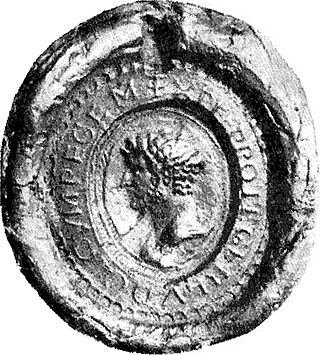
Louis the German, also known as Louis II of Germany and Louis II of East Francia, was the first king of East Francia, and ruled from 843 to 876 AD. Grandson of emperor Charlemagne and the third son of Louis the Pious, emperor of Francia, and his first wife, Ermengarde of Hesbaye, he received the appellation Germanicus shortly after his death, when East Francia became known as the kingdom of Germany.

Charles the Bald, also known as Charles II, was a 9th-century king of West Francia (843–877), King of Italy (875–877) and emperor of the Carolingian Empire (875–877). After a series of civil wars during the reign of his father, Louis the Pious, Charles succeeded, by the Treaty of Verdun (843), in acquiring the western third of the empire. He was a grandson of Charlemagne and the youngest son of Louis the Pious by his second wife, Judith.
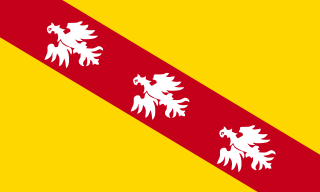
The Duchy of Lorraine, originally Upper Lorraine, was a duchy now included in the larger present-day region of Lorraine in northeastern France. Its capital was Nancy.

The Moselle is a river that rises in the Vosges mountains and flows through north-eastern France and Luxembourg to western Germany. It is a left bank tributary of the Rhine, which it joins at Koblenz. A small part of Belgium is in its basin as it includes the Sauer and the Our.

Freiherr Adolph Franz Friedrich Ludwig Knigge was a German writer, Freemason, and a leading member of the Order of the Illuminati.

East Francia or the Kingdom of the East Franks was a successor state of Charlemagne's empire ruled by the Carolingian dynasty until 911. It was created through the Treaty of Verdun (843) which divided the former empire into three kingdoms.
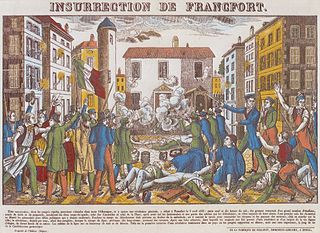
The Frankfurter Wachensturm on 3 April 1833 was a failed attempt to start a revolution in Germany.
Heinrich Marx was the father of the revolutionary leader and influential socialist thinker Karl Marx. He was a lawyer, and had eight children including Karl Marx and Louise Juta.
Heinz Schilling is a German historian.
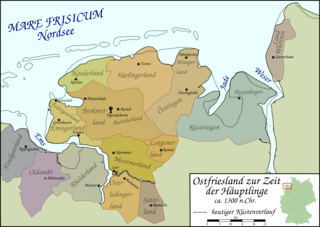
The East Frisian chieftains assumed positions of power in East Frisia during the course of the 14th century, after the force of the old, egalitarian constitution from the time of Frisian Freedom had markedly waned.

Ferdinand Malaisé, after 1862 Ritter Ferdinand von Malaisé. Knight of the Order of St. Joseph of Tuscany, the Iron Crown of Austria and the Bavarian Order of Merit, Major General, 1st Royal Bavarian Field Artillery Brigade, Professor of Mathematics, Royal Bavarian Cadet Corps and tutor to Ludwig III, the last King of Bavaria.

Edmund von Neusser was an Austrian internist of Polish origin.
Friedrich Wilhelm Karl, Ritter von Hegel was a German historian and son of the philosopher Georg Wilhelm Friedrich Hegel. During his lifetime he was a well-known and well-reputed historian who received many awards and honours. He was one of the major urban historians during the second half of the 19th century.
Ruotger, also spelled Rutger, Rudger or Rudgar, was the archbishop of Trier from 915. His archdiocese at first lay within the kingdom of West Francia, but after 925 it was annexed to East Francia, an event in which Ruotger played a major role.
Bettina Baumgärtel is a German art historian who is head of the painting collection of the Museum Kunstpalast in Düsseldorf. She is a leading authority on the art of Angelica Kauffman and founded the Angelika Kauffmann Research Project (AKRP), of which she is the director, in 1990.
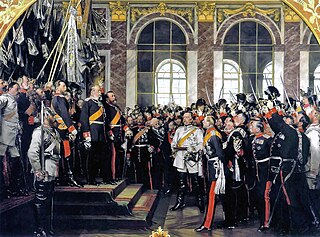
The proclamation of the German Empire, also known as the Deutsche Reichsgründung, took place in January 1871 after the joint victory of the German states in the Franco-Prussian War. As a result of the November Treaties of 1870, the southern German states of Baden, Hesse-Darmstadt, with their territories south of the Main line, Württemberg and Bavaria, joined the Prussian-dominated "German Confederation" on 1 January 1871. On the same day, the new Constitution of the German Confederation came into force, thereby significantly extending the federal German lands to the newly created German Empire. The Day of the founding of the German Empire, January 18, became a day of celebration, marking when the Prussian King William I was proclaimed German Emperor in Versailles.
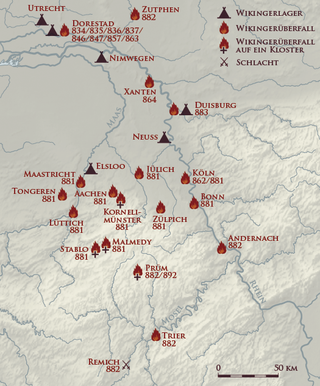
The Viking raids in the Rhineland were part of a series of invasions of Francia by the Vikings that took place during the final decades of the 9th century. From the Rhineland, which can be regarded as the nucleus of Frankish culture, the Franks had previously conquered almost the whole of Central Europe and established a great empire.
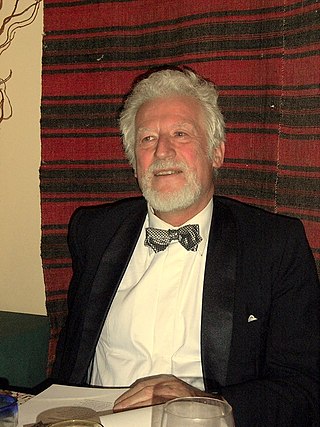
Helmut Birkhan is an Austrian philologist who is Professor Emeritus of Ancient German Language and Literature and the former Managing Director of the Institute for Germanic Studies at the University of Vienna.
Kurt Gossweiler was a German Marxist–Leninist historian and economist specializing in the history and economic structure of fascism.
References
- Classen, Peter: Die Verträge von Verdun und von Coulaines 843 als politische Grundlagen des westfränkischen Reiches. In: Ausgewählte Aufsätze von Peter Classen, J. Fleckenstein (Hg.), Sigmaringen 1983, S. 249–277 [zuerst 1963].
- Apsner, Burkhard: Vertrag und Konsens im früheren Mittelalter. Studien zu Gesellschaftsprogrammatik und Staatlichkeit im westfränkischen Reich (Trierer Historische Forschungen 58), Trier 2006.
- Krah, Adelheid, Die Entstehung der "potestas regia" im Westfrankenreich während der ersten Regierungsjahre Kaiser Karls II. (840–877), Berlin 2000, ISBN 3-05-003565-X, Kapitel 3: Die konstitutionelle Basis: Die Verträge von Verdun und Coulaines als Ergebnisse der Bruderkriege S. 187–256.
- Magnou-Nortier, Elisabeth: Foi et Fidélité. Recherches sur l'évolution des liens personnels chez les Francs du VIIe au IXe siècle (Publications de l'université de Toulouse-Le Mirail, Serie A, Bd. 28), Toulouse 1976.
- Penndorf, Ursula: Das Problem der "Reichseinheitsidee" nach der Teilung von Verdun (843). Untersuchungen zu den späten Karolingern (Münchener Beiträge zur Mediävistik und Renaissance-Forschung, Bd. 20), München 1974.
- Schramm, Percy Ernst: Der König von Frankreich. Das Wesen der Monarchie vom 9. zum 16. Jh., Ein Kapitel aus der Geschichte des abendländischen Staates, Bd. 1, Darmstadt 1960.
- Zöllner, Erich: Die politische Stellung der Völker im Frankenreich (Veröffentlichungen des Instituts für österreichische Geschichtsforschung, L. Santifaller (Hg.), Bd.XIII ), Wien 1950.
- Latin text in Le Capitulaire de Coulaines